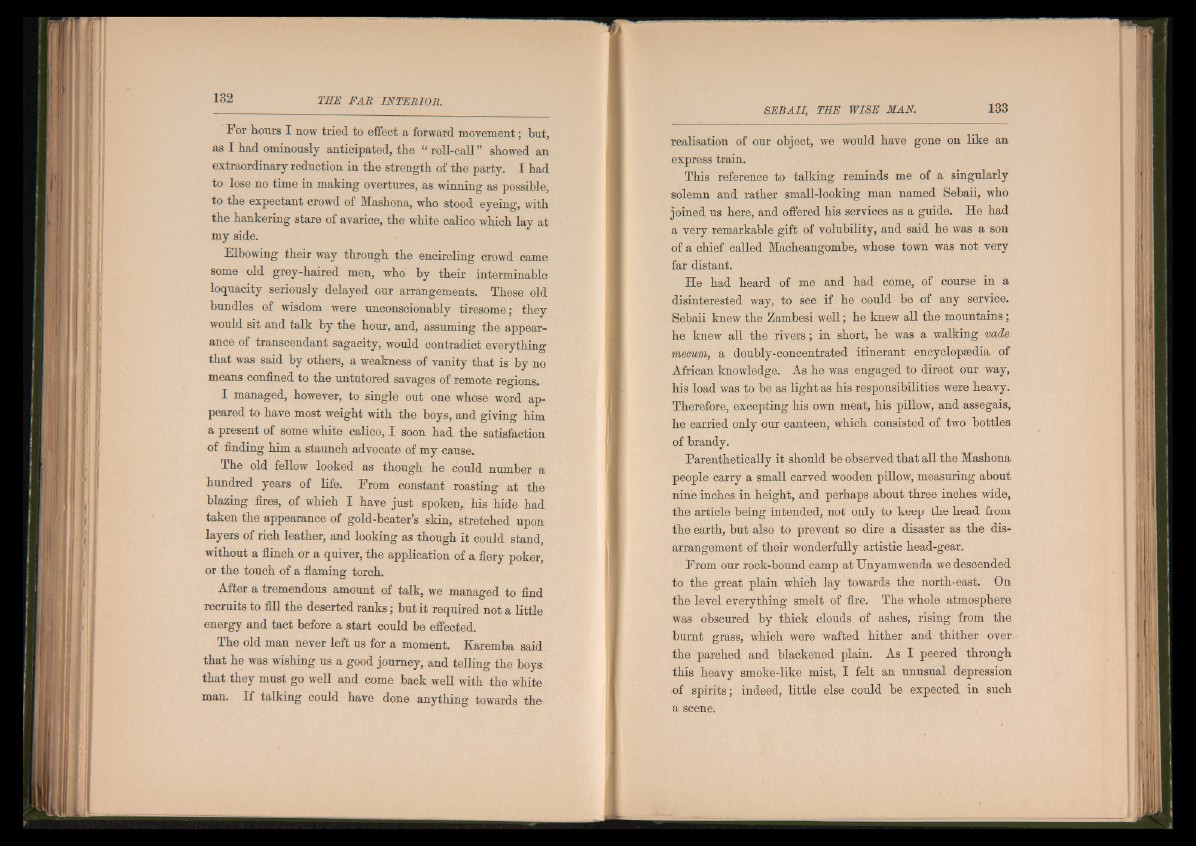
For hours I now tried to effect a forward movement; but,
as I had ominously anticipated, the “ roll-call ” showed an
extraordinary reduction in the strength of the party. I had
to lose no time in making overtures, as winning as possible,
to the expectant crowd of Mashona, who stood eyeing, with
the hankering stare of avarice, the white calico which lay at
my side.
Elbowing their way through the encircling crowd came
some old grey-haired men, who by their interminable
loquacity seriously delayed our arrangements. These old
bundles of wisdom were unconscionably tiresome; they
would sit and talk by the hour, and, assuming the appearance
of transcendant sagacity, would contradict everything
that was said by others, a weakness of vanity that is by no
means confined to the untutored savages of remote regions.
I managed, however, to single out one whose word appeared
to have most weight with the boys, and giving him
a present of some white calico, I soon had the satisfaction
of finding him a staunch advocate of my cause.
The old fellow looked as though he could number a
hundred years of life. From constant roasting at the
blazing fires, of which I have just spoken, his hide had
taken the appearance of gold-beater’s skin, stretched upon
layers of rich leather, and looking as though it could stand,
without a flinch or a quiver, the application of a fiery poker,
or the touch of a flaming torch.
After a tremendous amount of talk, we managed to find
recruits to fill the deserted ranks; but it required not a little
energy and tact before a start could be effected.
The old man never left us for a moment. Karemba said
that he was wishing us a good journey, and telling the boys
that they must go well and come back well with the white
man. If talking could have done anything towards the
realisation of our object, we would have gone on like an
express train.
This reference to talking reminds me of a singularly
solemn and rather small-looking man named Sebaii, who
joined us here, and offered his services as a guide. He had
a very remarkable gift of volubility, and said he was a son
of a chief called Macheangombe, whose town was not very
far distant.
He had heard of me and had come, of course in a
disinterested way, to see if he could be of any service.
Sebaii knew the Zambesi well; he knew all the mountains;
he knew all the rivers; in short, he was a walking vade
mecwn, a doubly-concentrated itinerant encyclopaedia of
African knowledge. As he was engaged to direct our way,
his load was to be as light as his responsibilities were heavy.
Therefore, excepting his own meat, his pillow, and assegais,
he carried only our canteen, which consisted of two bottles
of brandy.
Parenthetically it should be observed that all the Mashona
people carry a small carved wooden pillow, measuring about
nine inches in height, and perhaps about three inches wide,
the article being intended, not only to keep the head from
the earth, but also to prevent so dire a disaster as the disarrangement
of their wonderfully artistic head-gear.
From our rock-bound camp at Unyamwenda we descended
to the great plain which lay towards the north-east. On
the level everything smelt of fire. The whole atmosphere
was obscured by thick clouds of ashes, rising from the
burnt grass, which were wafted hither and thither over
the parched and blackened plain. As I peered through
this heavy smoke-like mist, I felt an unusual depression
of spirits; indeed, little else could be expected in such
a scene.